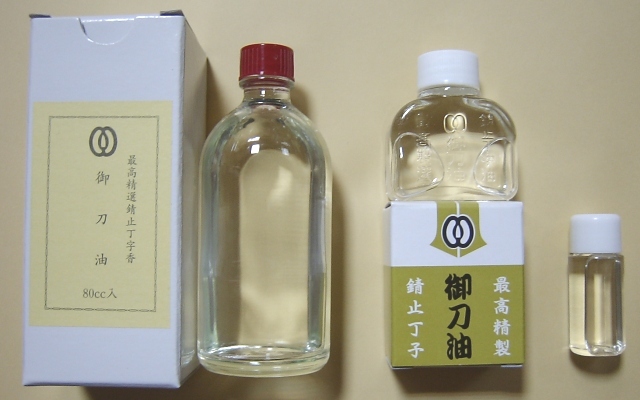By lyuesword | 03 February 2021 | 0 Comments
What is Choji Oil and Why is it Used on Japanese Swords
Like all swords, the Japanese katana requires regular maintenance and care to preserve its integrity. When neglected, an otherwise pristine katana may develop rust and corrosion. Granted, minor instances of "surface rust" can be buffed and polished out. If the rust has settled deep into the blade's steel, however, this may not be an option.
Thankfully, there are ways to protect a katana from rust and corrosion, including the use of choji oil.
Overview of Choji Oil
Choji oil is a special type of oil that's designed specifically for protecting and preserving swords and other bladed weapons. It originated in feudal Japan many centuries ago, during which samurai warriors would use it to protect their swords from rust. Even after all those years, though, little has changed regarding choji oil or the way in which it's used.
So, what is choji oil exactly? While its composition varies, it typically consists of a combination of clove oil extract and mineral oil at a ratio of 1:10 to 1:100, respectively. In other words, it contains 1% to 10% clove oil mixed with 90% to 99% mineral oil. This combination results in a superior oil that's highly effective at protecting swords like the katana from rusting.
When applied to a katana -- or any bladed weapon for that matter -- choji oil creates a barrier of protection between the steel and the outside environment. You see, a katana develops rust as a result of oxidation from moisture. When moisture reaches the blade, it reacts with iron to form a new metal known as iron oxide (rust). Applying choji oil to a katana is a relatively simple and straight-forward process. Assuming the blade has already been cleaned, you can apply the oil using a soft flannel cloth. Alternatively, nuguigami tissue can be used to apply choji oil. Unlike flannel cloth, however, nuguigami tissue is only good for a single use, after which it must be replaced.
Applying choji oil to a katana is a relatively simple and straight-forward process. Assuming the blade has already been cleaned, you can apply the oil using a soft flannel cloth. Alternatively, nuguigami tissue can be used to apply choji oil. Unlike flannel cloth, however, nuguigami tissue is only good for a single use, after which it must be replaced.
Other Tips for Katana Maintenance
In addition to applying choji oil, there are other steps you can take to preserve and protect your katana, including the following:
• Store the katana in a sheath with the blade's cutting edge facing upward
• Wash and dry hands before holding or using the katana
• Avoid touching the blade with your bare hands or fingers
• Monitor and regulate the humidity of the environment in which your katana is stored
Want a unique sword? Feel free to contact us:
Email: lyuesword@hotmail.com
Website: www.lyuesword.com
Custom Sword Page: www.lyuesword.com/Custom-Sword/customization-options/Create-Your-Own-Swords
Thankfully, there are ways to protect a katana from rust and corrosion, including the use of choji oil.
Overview of Choji Oil
Choji oil is a special type of oil that's designed specifically for protecting and preserving swords and other bladed weapons. It originated in feudal Japan many centuries ago, during which samurai warriors would use it to protect their swords from rust. Even after all those years, though, little has changed regarding choji oil or the way in which it's used.
So, what is choji oil exactly? While its composition varies, it typically consists of a combination of clove oil extract and mineral oil at a ratio of 1:10 to 1:100, respectively. In other words, it contains 1% to 10% clove oil mixed with 90% to 99% mineral oil. This combination results in a superior oil that's highly effective at protecting swords like the katana from rusting.
When applied to a katana -- or any bladed weapon for that matter -- choji oil creates a barrier of protection between the steel and the outside environment. You see, a katana develops rust as a result of oxidation from moisture. When moisture reaches the blade, it reacts with iron to form a new metal known as iron oxide (rust).

Other Tips for Katana Maintenance
In addition to applying choji oil, there are other steps you can take to preserve and protect your katana, including the following:
• Store the katana in a sheath with the blade's cutting edge facing upward
• Wash and dry hands before holding or using the katana
• Avoid touching the blade with your bare hands or fingers
• Monitor and regulate the humidity of the environment in which your katana is stored
Want a unique sword? Feel free to contact us:
Email: lyuesword@hotmail.com
Website: www.lyuesword.com
Custom Sword Page: www.lyuesword.com/Custom-Sword/customization-options/Create-Your-Own-Swords
Leave a Reply
Your email address will not be published.Required fields are marked. *